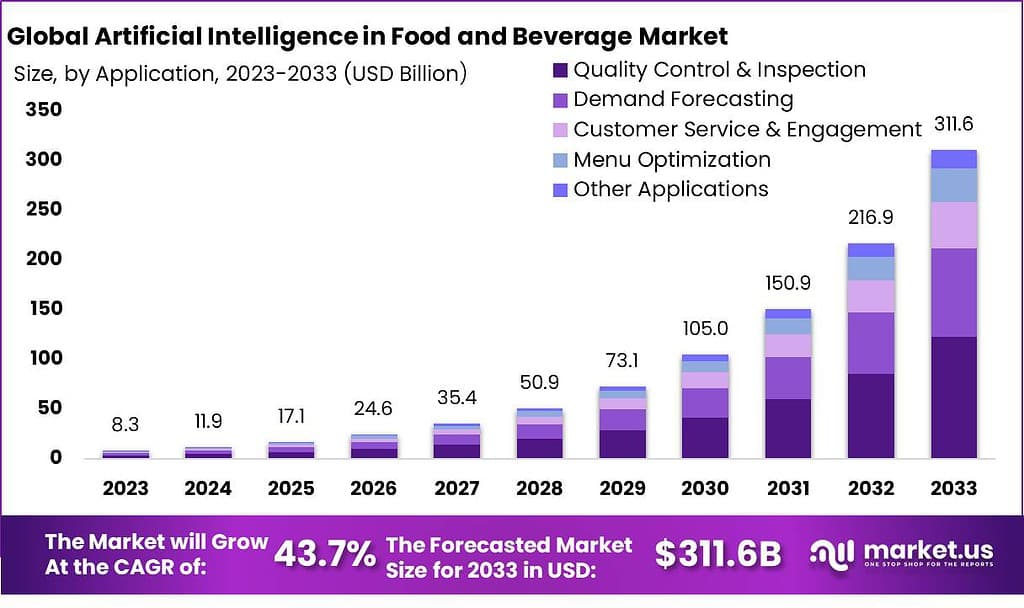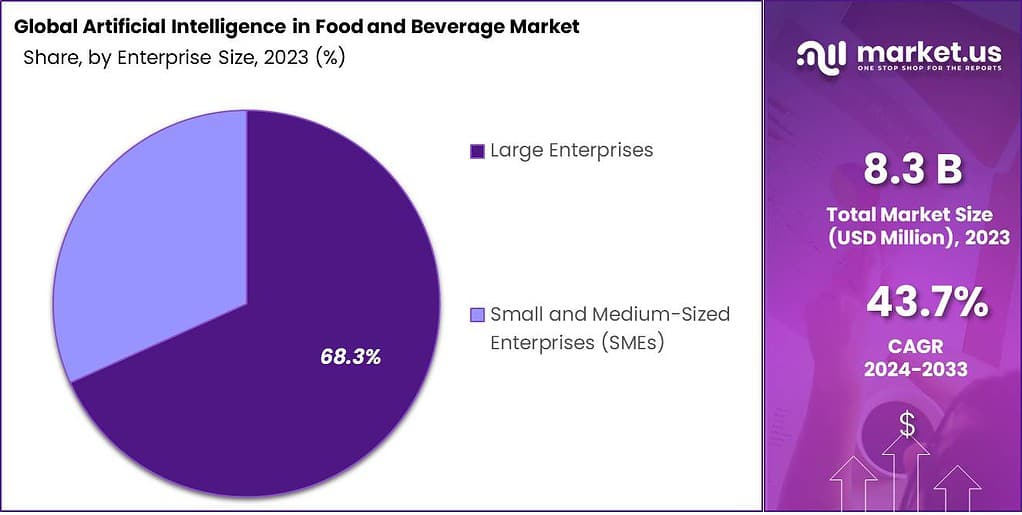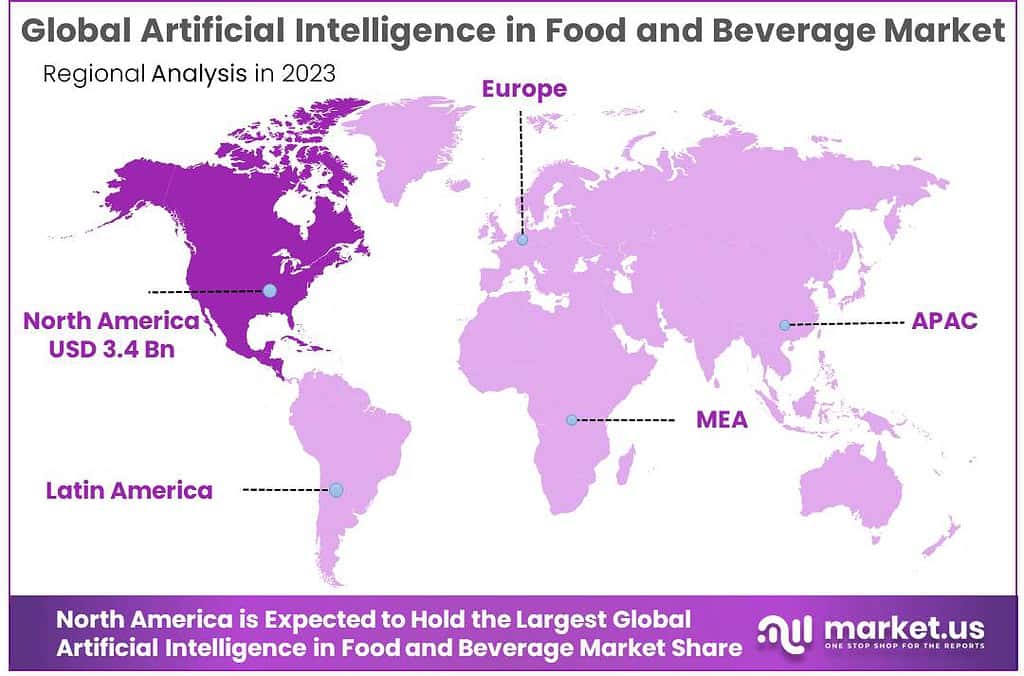New York, Dec. 14, 2023 (GLOBE NEWSWIRE) -- According to Market.us, The Global Artificial Intelligence in Food and Beverage Market is projected to be worth USD 8.3 billion in 2023. The market is likely to reach USD 311.6 billion by 2033. The market is further expected to surge at a CAGR of 43.7% during the forecast period 2024 to 2033.
The food and beverage industry is undergoing a significant transformation, driven by the rapid advancement of artificial intelligence (AI). This powerful technology is making waves across every stage of the food chain, from farm to table, offering a plethora of benefits and shaping the future of the industry. Artificial Intelligence (AI) is making significant advancements in the food and beverage industry, revolutionizing various aspects of the sector, from production and processing to distribution and customer experience. AI technologies are being employed to optimize processes, improve efficiency, enhance food safety, personalize customer experiences, and drive innovation
AI contributes to product development by generating new recipes and enhancing flavors based on consumer preferences and nutritional data. In terms of customer experience, AI facilitates personalized interactions, recommendations, and order management through chatbots and virtual assistants. The market for AI in the food and beverage industry is experiencing significant growth fueled by the increasing demand for food safety, efficient supply chain management, personalized customer experiences, technological advancements, and investments in AI technologies. The future of the market is promising, driven by continuous innovation and the integration of AI with other technologies like IoT and robotics.
Get a Complete and Professional Sample PDF @ https://market.us/report/artificial-intelligence-in-food-and-beverage-market/request-sample/

Key Takeaways
- Market Size and Growth: The Artificial Intelligence in Food and Beverage Market is projected to reach USD 311.6 billion by 2033, with a compound annual growth rate (CAGR) of 43.7% from 2024 to 2033. In 2023, the market size is estimated to be USD 8.3 billion.
- Role in Product Development: AI plays a crucial role in the development of new food and beverage products. It predicts flavor profiles and textures, leading to faster innovation to meet consumer demand.
- Impact on Enterprise Size: Large enterprises currently dominate the AI market in food and beverage, with a share of more than 68.3%. However, SMEs are gradually adopting cost-effective AI tools to streamline operations and improve competitiveness.
- Key Application Insights: Quality control and inspection hold the dominant market share (39.5%), followed by demand forecasting. AI's role in customer service and engagement, as well as menu optimization, is recognized for enhancing brand reputation and customer satisfaction.
- End-User Distribution: Food and beverage manufacturers lead the market (74.2%), using AI to optimize production efficiency and product safety. Restaurants and food service providers are also adopting AI for improved customer experiences and operational efficiency.
- Regional Analysis: North America leads in AI adoption in the food and beverage market, accounting for over 41.8% of the global market share in 2023. This is due to its advanced technological infrastructure and innovation focus.
- Key Players: Leading companies driving AI adoption in the food and beverage industry include Oracle Corporation, ABB Ltd., Honeywell International Inc., and IBM Corporation.
- Drivers: AI adoption is driven by the need to enhance efficiency and meet the demand for personalized experiences in the food and beverage industry.
- Challenges: Challenges include data security concerns and integration complexities as AI is integrated into existing operational frameworks.
- Opportunities: North America offers growth opportunities for AI-driven food tech startups, and ongoing advancements in AI algorithms provide possibilities for tailored AI solutions.
Report Segmentation
End-use Insights
In 2023, the Food & Beverage Manufacturers segment held a dominant market position in the Artificial Intelligence in Food and Beverage Market, capturing an impressive 74.2% share. This segment's supremacy can be attributed to the widespread adoption of AI technologies by food and beverage manufacturers to enhance production efficiency, quality control, and supply chain management. AI-driven solutions are utilized to optimize production processes, maintain consistent product quality, and efficiently manage inventory and distribution. These technologies empower manufacturers to streamline operations, cut costs, and respond more effectively to consumer demands, thereby solidifying their dominant position in the market.
Application Insights
In 2023, the Quality Control & Inspection segment held a dominant market position in the Artificial Intelligence in Food and Beverage Market, capturing an impressive 39.5% share. This segment's prominence can be attributed to the critical role that AI plays in ensuring the safety and quality of food products. AI-powered systems play a crucial role in real-time quality control and inspection processes, identifying anomalies, contaminants, and defects in food production lines. These technologies not only contribute to improving the overall quality of food products but also assist in meeting rigorous regulatory standards, a critical aspect in the food and beverage industry.
Enterprise Size
In 2023, the Large Enterprises segment held a dominant market position in the Artificial Intelligence in Food and Beverage Market, capturing a significant 68.3% share. This segment's dominance can be attributed to the substantial resources and capabilities that large enterprises possess to invest in and implement AI-driven solutions across various aspects of the food and beverage industry. Large food manufacturers, restaurant chains, and distributors have adopted AI technologies to enhance production efficiency, optimize supply chains, and deliver personalized customer experiences at scale. Additionally, large enterprises often have the capacity to develop and deploy custom AI solutions tailored to their specific needs, further solidifying their leadership in the market.

Regional Analysis
In 2023, North America held a dominant position in the Artificial Intelligence in Food and Beverage Market, securing a significant 41.8% share. This dominance can be attributed to the region's advanced technological infrastructure and the presence of major AI technology firms. North America's progressive adoption of AI in food processing, safety, and distribution channels has been pivotal in driving market growth. The region's focus on enhancing consumer experience and operational efficiency through AI integration in the food and beverage industry underlines its market leadership.

Competitive Landscape
The competitive landscape of the market has also been examined in this report. Some of the major players include:
- Oracle Corporation
- ABB Ltd.
- Honeywell International Inc.
- Rockwell Automation, Inc.
- IBM Corporation
- Nvidia Corporation
- Aboard Software
- TOMRA
- Analytical Flavor Systems
- Staqu Technologies
- Other Key Players
Scope of the Report
| Report Attributes | Details |
| Market Value (2023) | US$ 8.3 Billion |
| Forecast Revenue 2032 | US$ 311.6 Billion |
| CAGR (2023 to 2032) | 43.7% |
| North America Revenue Share | 41.8% |
| Base Year | 2022 |
| Historic Period | 2018 to 2022 |
| Forecast Year | 2023 to 2032 |
Driving Factors:
- Enhanced Quality Control: AI enables real-time monitoring and quality control in food production, reducing errors and ensuring consistent product quality, thereby driving the adoption of AI in the food and beverage industry.
- Demand for Personalization: Consumers seek personalized food experiences, and AI-powered recommendation systems enable restaurants and food providers to tailor menus and offerings to individual preferences, enhancing customer satisfaction.
- Supply Chain Optimization: AI-driven supply chain management helps in inventory forecasting, reducing wastage, and improving logistics efficiency, leading to cost savings and enhanced operational performance.
- Food Safety and Compliance: Stricter food safety regulations and the need for traceability have prompted the use of AI for food safety inspection, allergen detection, and compliance management, ensuring consumer safety and regulatory compliance.
Restraining Factors:
- High Implementation Costs: The initial investment required for AI adoption, including hardware, software, and staff training, can be prohibitive for smaller food and beverage businesses.
- Data Privacy Concerns: Handling sensitive consumer data for personalization raises privacy concerns, necessitating robust data protection measures and compliance with data regulations like GDPR.
- Lack of Skilled Workforce: A shortage of AI-skilled professionals in the food industry poses a challenge to effective implementation and management of AI solutions.
- Integration Complexity: Integrating AI systems with existing infrastructure and processes can be complex, leading to resistance and potential disruptions in operations.
Growth Opportunities:
- AI in Sustainable Agriculture: AI-driven precision agriculture can optimize resource usage, reduce environmental impact, and increase crop yields, aligning with the growing demand for sustainable food production.
- AI in Food Delivery: The expansion of AI-powered food delivery platforms and autonomous delivery solutions presents opportunities for improved efficiency and customer convenience.
- AI in Nutritional Analysis: AI applications for nutritional analysis and labeling enable consumers to make informed dietary choices, fostering the demand for AI-powered food products.
- AI in Restaurant Automation: Restaurants can leverage AI for automated order processing, kitchen robotics, and customer service chatbots to enhance operational efficiency and reduce labor costs.
Challenges:
- Ethical Concerns: AI applications raise ethical questions regarding job displacement, data privacy, and the ethical use of AI in food production and marketing.
- Regulatory Compliance: Adhering to evolving regulations and standards for AI-driven food production, labeling, and safety poses ongoing challenges for businesses.
- Interoperability Issues: Ensuring seamless integration and compatibility of AI systems with diverse hardware and software platforms remains a challenge.
- Consumer Trust: Gaining and maintaining consumer trust in AI-powered food products and services requires transparency and effective communication regarding AI usage and safety.
Market Segments
By Application
- Quality Control & Inspection
- Demand Forecasting
- Customer Service & Engagement
- Menu Optimization
- Other Applications
Enterprise Size
- Small and Medium-Sized Enterprises (SMEs)
- Large Enterprises
End-User
- Food & Beverage Manufacturers
- Restaurants & Food Service Providers
- Other End-Users
By Geography
- North America
- The US
- Canada
- Europe
- Germany
- France
- The UK
- Spain
- Italy
- Russia
- Netherland
- Rest of Europe
- APAC
- China
- Japan
- South Korea
- India
- Australia
- New Zealand
- Singapore
- Thailand
- Vietnam
- Rest of APAC
- Latin America
- Brazil
- Mexico
- Rest of Latin America
- Middle East & Africa
- South Africa
- Saudi Arabia
- UAE
- Rest of MEA
Trending Industry Reports
- Cloud Security Market Growth ($148.3 Bn by 2032 at 22.5% CAGR) Global Analysis by Market.us, North-America Dominates with 42.4% of the Market Shareby 2032
- Generative AI in Music Market to Reach Valuation of USD 2.6 Bn at CAGR of 28.6% by 2032
- Generative AI in Healthcare Market Set to Reach a Valuation of USD 17.2 Bn by 2032 | Data Analysis by Experts at Market.us
- Generative AI in Fintech Market Size to Exceed US$ 6.2 Bn by 2032: Report by Market.us
- Generative AI in Marketing Market Predicted to Garner US$ 22.1 Bn by 2032, At CAGR 28.6%
- Generative AI in Gaming Market Forecasted to Accelerate at 23.3% CAGR by 2032 | Global Analysis by Market.us
- Generative AI in Conference Market Growth Accelerating at a CAGR of 18.5% With Rise in Ongoing Trend of Video Conferences | Exclusive Report by Market.us
- AI Voice Generator Market Size to Reach USD 4,889 Million by 2032, CAGR 15.40%
- AI Video Generator Market Will Expand Around USD 2,172 Million by 2032 | Asia Pacific to Account for 32% Revenue Share
- Educational Robots Market to Cross to US$ 5.10 Bn in Revenues by 2032, Higher Education Held 35% of the Market Share
- Digital Asset Management Market to Reach USD 15.2 Bn by 2032, Asia Pacific Dominates with 34.8% of the Market Share
- Cyber Security Market Size Is Valued At US$ 534 Bn by 2032: Data Analysis by Experts at Market.Us
- Artificial Intelligence Market to Reach US$ 2745 Bn by 2032, North America is Expected to Dominate the Worldwide Market
- Generative AI Market Observes Strong Growth Potential, With Projected Market Size of USD 151.9 Bn by 2032
- Generative AI in Fashion Market to Expand at a CAGR of 36.9%, Witnessing a Surge in Growth Opportunities by Providing Unique Experiences
- Generative AI in Animation Market Gains Momentum with Growing Adoption in Video Design & Animation, Projected to Grow at 35.7% between 2023-2032
About Us
Market.US (Powered by Prudour Pvt Ltd) specializes in in-depth market research and analysis and has been proving its mettle as a consulting and customized market research company, apart from being a much sought-after syndicated market research report-providing firm. Market.US provides customization to suit any specific or unique requirement and tailor-makes reports as per request. We go beyond boundaries to take analytics, analysis, study, and outlook to newer heights and broader horizons.Follow Us On LinkedIn Facebook TwitterOur Blog:
